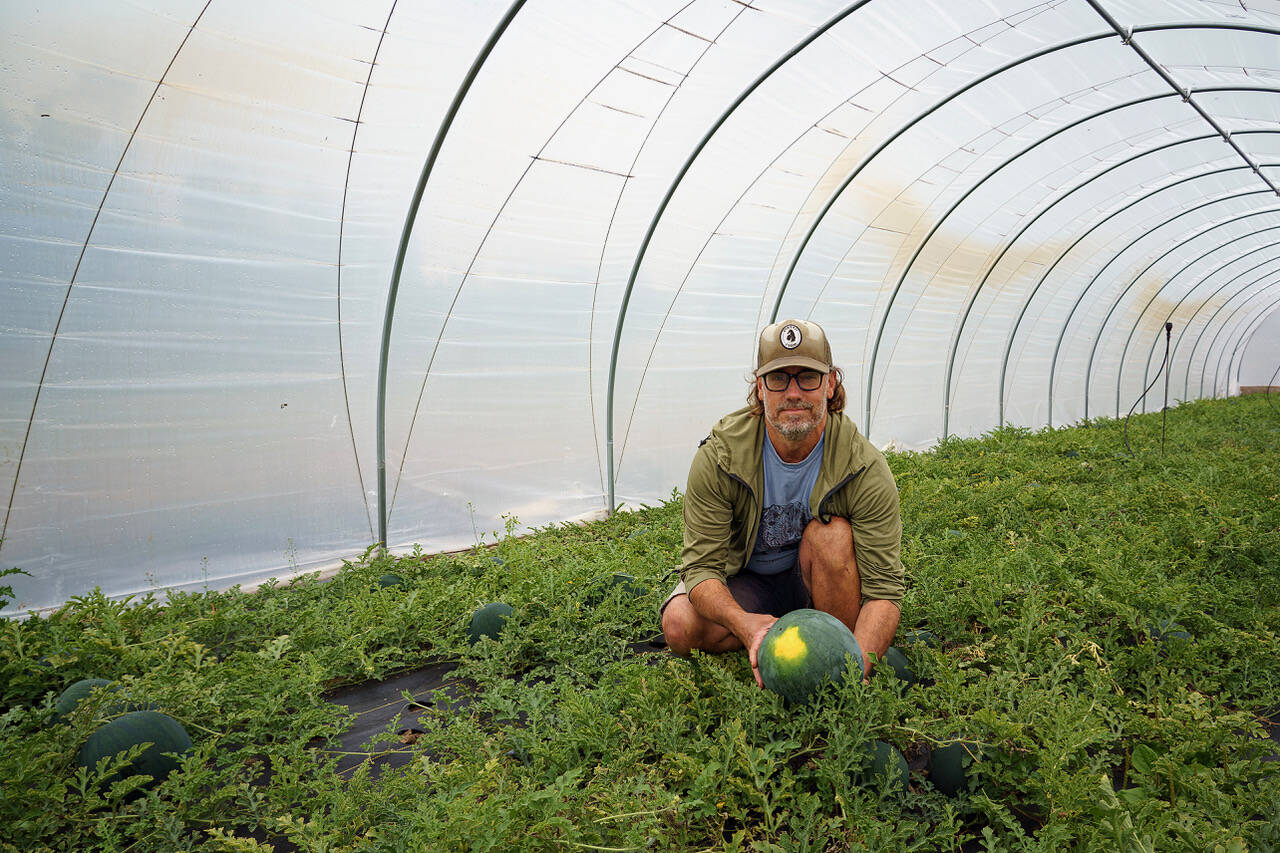As the saying goes, “you can take the kid out of the South, but you can’t take the South out of the kid.” In other words, anyone growing up in the Deep South of America is likely to carry a lifetime of drawl-and-drama wherever they go. In the case of Stephen and Amy Williams of Foxtail Farm, that’s a good thing – in fact, a very delicious thing.
With former feet firmly planted in Southern soil, specifically North Carolina, the hard-working family behind all that fresh produce in Freeland christened their farm on Whidbey Island in 2014. Stephen’s transformative decision to attend Whidbey’s nonprofit Organic Farm School led to an uprooting of their lives, quite literally plopping their Southern-ness deep into the farmlands of South Whidbey.
The edible evidence crops up every summer and autumn when downhome crops such as watermelon, sweet potatoes, collard greens, okra, eggplant, cucumbers, yellow summer squash and ginger, start pushing through the carefully tilled grounds, oblivious of their genus homeland being thousands of miles away.
A special passion is growing perky little peppers by the hundreds, and not just any ole pepper. The ones cultivated and harvested fresh at Foxtail range from shishito peppers to poblano, Anaheim, pasilla and jalapeño peppers, as well as sweet bells and sweet Italian versions.
Undeterred by the unlikely prospect of growing non-native plants in the Pacific Northwest, the Foxtail Farm couple has proved their crops, as well as their family, can integrate quite well into a chosen habitat –– with a bit of care and proper feeding.
“I like growing things that don’t necessarily thrive in the Northwest. I like the challenge,” Stephen said.
As a child, Stephen remembers strong connections to Southern foods, even if not realizing how distinctly regional and cultural they were. “I grew up eating all the things I now grow; both my grandmothers were expert Southern cooks, so I had a steady diet of it every week,” he explains.
Take the okra, for example. Many people know it as a cute little alternatively named “lady finger” with somewhat slimy insides, one that reigns supreme in dishes such as Louisiana gumbo. However, okra is far more common throughout the South as a side dish, either deep fried in a cornmeal batter or stewed with tomatoes and onions. Okra can also be steamed, pickled, sauteed, grilled or roasted.
There’s even a thing called North Carolina okra fries, with customized versions such as Chai Pani okra fries from Indian street food in Asheville. It’s basically julienned strips of okra deep-fried in canola oil and sprinkled with lime juice and salt.
Though Williams skipped planting okra for this summer’s crop, the family kitchen here on Whidbey typically goes for the downhome method: Dice the okra into half-inch pieces, dip them in some milk and then dredge them in a 50/50 blend of all-purpose flour and medium-ground corn meal. Fry in a cast-iron skillet (of course) until golden brown.
Then there’s the ever-loved juicy watermelons. Though commonly sold in Washington, they typically arrive from warm and sunny California, the largest producer of watermelons on the West Coast. Southern states, including North Carolina, collectively produce the most watermelons by far, according to the USDA.
Growing them on Whidbey is a sight to behold, and luckily, Foxtail Farm gives the giant beauties plenty of space to reach juicy perfection. They start sweetening up for consumption by mid-summer and often last into autumn – unless other islanders gobble them all up.
As for how to eat them, Stephen keeps it simple, as is mostly the Southern way of enjoying earth’s bounty.
“Sometimes I like a little salt on my watermelon, but most of the time I eat it fresh by itself,” he said. “I don’t have any weird ways to eat watermelon, but Vincent Nattress, chef/owner of Orchard Kitchen, will pickle the watermelon rind and serve it at the restaurant. I don’t know how he does it, but it’s quite tasty and a good way to not waste anything.”
Stephen does note that watermelon salsa is a nice summer snack; instead of tomatoes, replace them with diced watermelon. He also explains how watermelon kombucha is an excellent summer drink. Just add filtered watermelon juice during the second fermentation of the kombucha-making process, he says. After a few weeks, it’s ready to drink.
In addition to their other crops, the now-prospering, soil-whispering farmers in Freeland plan to continue providing the organic, Deep South comfort-food vegetables for their own table as well as those across Whidbey Island.
“Growing up in the South was great, but I don’t miss the heat and humidity,” Stephen said. “I chose Whidbey because of the community. It’s a great place to live with an incredibly supportive community that has embraced Foxtail since the beginning.”
Foxtail Farm primarily sells direct to consumers through their own farm stand, the Bayview Farmers Market and the Whidbey Island Grown Food Hub. The stand sits at the entrance of the farm where, if you’re lucky, you might get a glimpse of their well-loved 1964 vintage Farmall Cub tractor. The farm stand is located at 5442 Shore Meadow Road in Freeland. It’s open seasonally from “sun-up to sun-down” every day. Stop on by, as they say down south.


